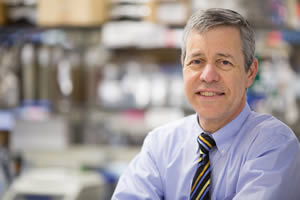
HIV and AIDS Research
NIH Funds NYC Center for AIDS Research
June 8, 2017—(BRONX, NY)—The National Institutes of Health has awarded researchers at Albert Einstein College of Medicine, The Rockefeller University, and The City University of New York Graduate School of Public Health and Health Policy (CUNY), a $7.5 million grant for the Center for AIDS Research focused on preventing HIV transmission and ending the AIDS epidemic.

Harris Goldstein, M.D. Directed by Harris Goldstein, M.D., professor of pediatrics and of microbiology & immunology at Einstein, the Einstein-Rockefeller-CUNY Center for AIDS Research (ERC-CFAR) brings together a powerful team of more than 150 investigators from the three institutions.
"The new CFAR builds on Einstein and Montefiore’s longstanding achievements in HIV and AIDS research and our shared commitment to social justice,” says Dr. Allen M. Spiegel, the Marilyn and Stanley M. Katz Dean at Einstein and executive vice president and chief academic officer at Montefiore Medicine. “Expanding our work to include peer institutions that span the city and research spectrum will aid our efforts to translate findings into better prevention, therapies, beneficial population health outcomes and, hopefully, a cure.”
“We are committed to focusing research efforts on the goal of stopping the AIDS epidemic—particularly in the economically and socially challenged populations at the highest risk for infection—by preventing new infections, advancing treatment, and developing a scalable cure,” says Dr. Goldstein, who also holds the Charles Michael Chair in Autoimmune Diseases at Einstein and is principal investigator of the grant. “Our partnership enables us to combine and synergize the ample basic science, clinical research, and population health expertise within our three institutions, along with our extensive access to patients and strong public health experience to achieve this goal.”
Comprehensive Research Agenda
The Einstein-Rockefeller-CUNY Center for AIDS Research, he adds, is driving a “bench-to-bedside-to-community and back-to-the-bench” research agenda, with resources devoted to behavioral science, clinical translation of research findings into novel treatments, the discovery of biomarkers, applying advanced technologies for improving clinical outcomes and developing an HIV vaccine. Experts in implementation science will determine and apply the most effective ways to provide patient care, therapies, testing, and pre-exposure prophylaxis (PrEP) and post-exposure prophylaxis (PEP) medications to prevent HIV acquisition.
“The new CFAR builds on Einstein and Montefiore’s longstanding achievements in HIV and AIDS research and our shared commitment to social justice.”
– Dean Allen M. Spiegel, M.D.
“This is a wonderful opportunity that is bringing key groups together to innovate new approaches to treat and control HIV spread in our community,” says Charles Rice, Ph.D., an ERC-CFAR associate director and the Maurice R. and Corinne P. Greenberg Professor in Virology and head of Rockefeller’s Laboratory of Virology and Infectious Disease.
The new center is one of 19 CFARs nationwide that are funded as part of an NIH-coordinated initiative to support multidisciplinary research aimed at reducing the burden of HIV in the United States and abroad.
A major focus of the ERC-CFAR's mission is to translate research into sustainable implementation of population level interventions and strategies that have the potential to improve HIV-related outcomes and reduce health disparities on a large scale.
"We have made tremendous progress in mitigating the impact of HIV, and we are taking active steps towards ending the HIV epidemic in New York,” says Denis Nash, Ph.D., M.P.H., the Executive Director of CUNY's Institute for Implementation Science in Population Health, and an associate director of the ERC-CFAR. “However, in New York and around the country, major socioeconomic and racial/ethnic disparities exist in HIV incidence and death. Many of the solutions to ending the HIV epidemic and the inequities that come with it lie in the design of strategies used to package, routinely deliver, and scale evidence-based interventions within systems,” continues Dr. Nash. “This is why the ERC-CFAR emphasizes and supports the use of implementation science approaches to advance our research agenda and achieve better population health outcomes."
The leadership team of the center includes two additional associate directors: Sarah Schlesinger, M.D., of Rockefeller, who is an expert on designing and implementing immune-based clinical trials to prevent HIV-1 infection and Betsy Herold, M.D., of Einstein, who is a leader in developing safe and effective topical microbicides for preventing HIV, genital herpes and other sexually transmitted infections.
HIV in NYC
New York City is considered “an HIV epicenter,” says Dr. Goldstein. More than 114,000 New Yorkers are living with HIV/AIDS and HIV is the third leading cause of death for NYC residents ages 35 to 54. In 2015, there were 2,493 new HIV diagnoses and 1,307 new AIDS diagnoses in New York City, according to the annual 2015 HIV/AIDS Surveillance Report from the New York City Department of Health and Mental Hygiene.
“The NYC location of our center serves both as a stimulant to reduce the anguish of HIV/AIDS in our hometown, and as a strategic research site for our collaborative mission to develop new advances in HIV treatment, prevention and cures,” adds Dr. Goldstein.
On June 19, the new center will host an inaugural symposium at Einstein featuring Dr. Anthony Fauci, Director of the NIH National Institute of Allergy and Infectious Diseases (NIAID), Dr. Mary Bassett, Commissioner of the New York City Department of Health and Mental Hygiene and Dr. Michel Nussenzweig, professor and head of the Laboratory of Molecular Immunology at The Rockefeller University.
The grant is titled “Einstein-Rockefeller-CUNY Center for AIDS Research” (1P30AI124414-01A1).
Other Top Stories
9/11 World Trade Center Exposure Linked to Heart Disease Among NYC Firefighters
On Becoming a Physician: New Einstein Students Receive White Coats and Stethoscopes
Novel Therapy for Acute Migraine Shows Promise in Phase 3 Clinical Trial
First Complete Wiring Diagram of an Animal's Nervous System
Multimillion Dollar NIH Grant to Help Reduce Opioid Use & Get Care to People Who Need It
NIH Grant Funds $23 Million Study of Diseases Affecting People Living with HIV
New TAILORx Data Guides Adjuvant Therapy in Younger Breast Cancer Patients
Einstein Celebrates Its 61st Commencement
Bolstering Biopsies: Testing Patients' Individual Cells to Guide Treatment



